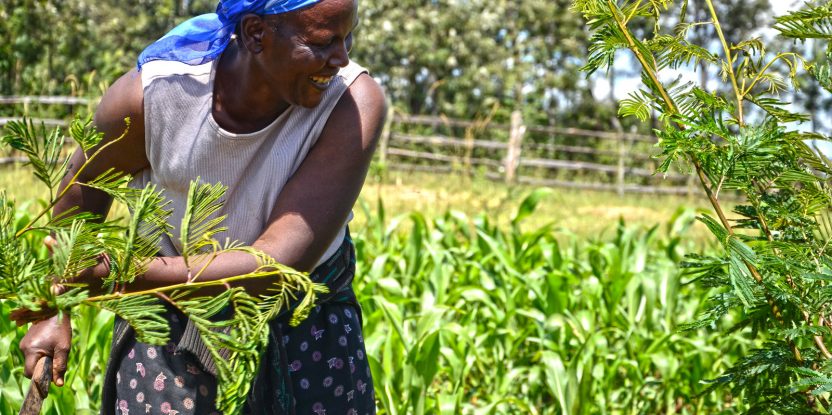
Agroecology, as an approach, promises a more sustainable and resilient future for food systems through minimizing damage to natural resources, reducing use of chemical inputs (e.g., fertilizers), and increasing social inclusion. Yet, despite widespread support from social movements, agroecological transitions are still constrained by a lack of holistic performance metrics, top-down innovation systems, and weak incentives and investments by private and public sector actors.
These three ‘lacks’ are the impetus for the new CGIAR Program on Agroecological Transitions for Building Resilient and Inclusive Agricultural and Food Systems (TRANSITIONS), which was officially launched at an online event on 20 October and attended by almost 250 people. Over the next four years, the Agroecological Transitions program aims to empower farmers to make large-scale “climate-informed agroecological transitions” by developing innovative 1) holistic metrics, 2) farmer-inclusive digital tools and 3) traceable private-public sector incentives and investments for food systems across three continents [See figure].

Scope of the TRANSITONS program (2022-2025). Created with mapchart.net
All three projects will interact through the Transformative Partnership Platform on Agroecology (Agroecology TPP) and coordinate with global partnerships and initiatives, such as the World Business Council for Sustainable Development, the World Benchmarking Alliance and the one CGIAR initiative on Transformational Agroecology Across Food, Land and Water Systems.
The first TRANSITONS project (Metrics to support agroecological transitions) aims to develop holistic metrics to measure agroecological performance. It is led by Christine Lamanna, scientist at the Center for International Forestry Research and World Agroforestry (CIFOR-ICRAF).
“Metrics are a value statement,” said Lamanna. “They show what we consider to be important and are the currency that enables decision making. The metrics we have for food systems now tend to be narrowly focused on agricultural productivity, yield or profitability. This approach fails to capture the environmental, social and livelihood data that are critical to sustainability.”
In response, the Metrics Project will develop and test a novel set of performance metrics that farmers can use in the field to measure the multiple impacts of their activities — from yields and productivity to biodiversity and social inclusion. They will also develop guidelines and training programs for project managers, government agencies, and businesses.
The second project, led by Lini Wollenberg from The Alliance of Biodiversity and CIAT (The Alliance), will develop socially inclusive digital tools (ATDT). Wollenberg noted that many of the sustainable farming tools that currently exist are inaccessible or irrelevant to smallholders. Only one quarter of tools from a recent global review had farmer-driven content. Through the TRANSITONS program, her team will identify ways of better using digital tools to co-design new practices with farmers.
The third project on incentives and investments (Private sector incentives and investments – PSII – for climate change, resilience and environmental sustainability) is led by Jonathan Mockshell from The Alliance. In his talk, Mockshell acknowledged concerns from several stakeholders that businesses are often perceive to engage in “green washing” — claiming they are acting sustainably without being transparent about their practices, motives, interests, and investments. This project is developing inclusive incentive mechanisms and traceable investments for private and public sector stakeholders. The team will work with stakeholders to increase transparency and traceability in supply chains, and scale-out inclusive business models.
Bringing businesses on board calls for clear and effective communication, noted Mockshell.
“When you want to engage private sector, you have to reduce the complexity of scientific concepts, and keep things simple and agile,” he said.
While financial incentives for businesses are important, jumpstarting agroecological transitions requires people to change their behaviors at the local level, stressed Vijay Kumar Thallam, who is responsible for implementing the Andhra Pradesh Community-Managed Natural Farming (APCNF) program. Farmers need to be empowered to shape agroecology in their image. For example, he highlighted how APCNF has helped 8.3 million rural women organize into well-managed cooperatives that are currently driving sustainable initiatives.
When asked during the Q&A session about how one measures behavioural change towards agroecological farming, Thallam put farmers at the centre.
“For 40-50 years, farmers have been told that they can’t produce more crops without more chemical fertilizers…we are finding that when we have digital tools plus farmer empowerment [e.g., through cooperatives and training], there are many ways to measure behavioural change. The research is showing that once farmers’ practices improve, their cost reduction is significant, which is a good signal for behavioural change that favours ground-up agroecological transitions.”
The TRANSITIONS program will be implemented by The Alliance of Bioversity and CIAT, CIFOR-ICRAF, IRRI, IWMI, The Transformative Partnership Platform on Agroecology, and the University of Vermont. It is generously funded by the European Union and managed by IFAD.
Key contacts of the program are:
- Metrics: Christine Lamanna (c.lamanna@cgiar.org) and Matthias Geck (m.geck@cgiar.org)
- Inclusive digital tools: Lini Wollenberg (lini.wollenberg@uvm.edu) and Sadie Shelton (s.shelton@cgiar.org)
- Private sector incentives and investments: Jonathan Mockshell (j.mockshell@cgiar.org) and Silvia Araujo de Lima (s.delima@cgiar.org)
You can watch the recording of the launch event at https://www.youtube.com/watch?v=Bs-IpwIQoe8
We want you to share Forests News content, which is licensed under Creative Commons Attribution-NonCommercial-ShareAlike 4.0 International (CC BY-NC-SA 4.0). This means you are free to redistribute our material for non-commercial purposes. All we ask is that you give Forests News appropriate credit and link to the original Forests News content, indicate if changes were made, and distribute your contributions under the same Creative Commons license. You must notify Forests News if you repost, reprint or reuse our materials by contacting forestsnews@cifor-icraf.org.